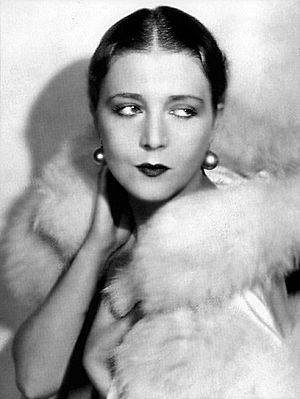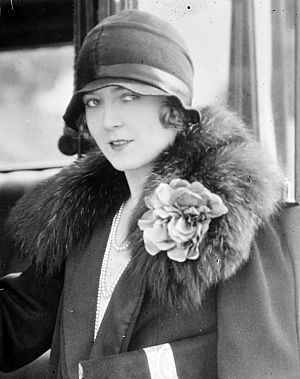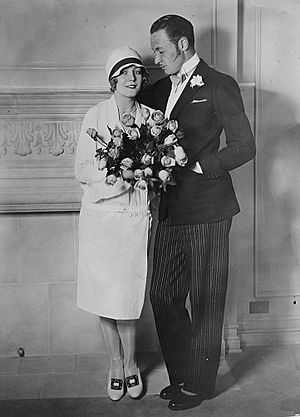Vilma Bánky facts for kids
Quick facts for kids
Vilma Bánky
|
|
|---|---|

Bánky in 1929
|
|
| Born | 9 January 1901 Nagydorog, Tolna County, Austria-Hungary (present-day Nagydorog, Republic of Hungary)
|
| Died | 18 March 1991 (aged 90) Los Angeles, California, U.S.
|
| Occupation | Actress |
| Years active | 1919–1933 |
| Spouse(s) |
Rod La Rocque
(m. 1927; |
Vilma Bánky (born Vilma Koncsics on January 9, 1901 – died March 18, 1991) was a famous Hungarian-American actress. She starred in movies when films had no sound, known as silent films.
Vilma started her acting career in Budapest. She also worked in France, Austria, and Germany. However, she became most famous for her roles in American movies. She starred in The Eagle and The Son of the Sheik with the legendary actor Rudolph Valentino. She also appeared in many romantic films with Ronald Colman.
Contents
Early Life and First Steps in Acting
Vilma Bánky was born on January 9, 1901, in Nagydorog, which was part of Austria-Hungary at the time. Her father, János Bánky Koncsics, worked for the government. Her mother was Katalin Ulbert.
Soon after Vilma was born, her family moved to Budapest because her father, a police sergeant, was transferred. She had an older brother, Gyula, and a younger sister, Gizella. After finishing high school, Vilma took classes to become a stenographer, which is someone who types notes quickly. But then, she was offered a role in a movie!
Her very first movie was Im Letzten Augenblick (In the last moment). It was filmed in Germany in 1919 and is now lost. In 1925, a Hollywood film producer named Samuel Goldwyn discovered Vilma during a trip to Budapest. He signed her to a contract, meaning she would work for him. Even though her parents and fiancé did not want her to be an actress, she moved to the United States in March 1925. She arrived to a lot of excitement and attention.
A Star in Silent Films
Vilma Bánky was called "The Hungarian Rhapsody" by the public. American audiences loved her right away. The New York Times newspaper praised her first American film, The Dark Angel (1925). They wrote that she was "a young person of rare beauty."
She starred alongside the famous silent film actor Rudolph Valentino in two popular movies: The Eagle (1925) and The Son of the Sheik (1926). It is said that Valentino was very impressed by Vilma and chose her to be his leading lady in these films.
Vilma also made several romantic movies with Ronald Colman. These included The Dark Angel and The Winning of Barbara Worth. People often thought her career ended because of her Hungarian accent when sound movies became popular. However, Vilma was also starting to lose interest in acting. She wanted to settle down with her husband, Rod La Rocque, and focus on her family life. By 1928, she had already started talking about retiring from films in a few years.
Out of her 24 movies, eight still exist completely today. These include Hotel Potemkin, Der Zirkuskönig (The King of the Circus), The Son of the Sheik, The Eagle, The Winning of Barbara Worth, The Night of Love, A Lady to Love, and The Rebel. Some other films only exist in small parts.
Life After Acting
After her acting career, Vilma Bánky spent her time selling real estate with her husband. She also enjoyed playing golf, which was her favorite sport. In 1981, Vilma created an educational fund called the Banky–La Rocque Foundation. This foundation helps support education.
Personal Life and Legacy
Vilma Bánky married actor Rod La Rocque in 1927. They were married for a long time, until he passed away in 1969. The couple did not have any children.
Vilma Bánky passed away on March 18, 1991, when she was 90 years old. News of her death was not shared with the public until the next year. She had asked her lawyer not to announce her death. Her ashes were scattered at sea, just like her husband's had been.
For her important work in movies, Vilma Bánky received a star on the Hollywood Walk of Fame in 1960. Her star can be found at 7021 Hollywood Boulevard.
Filmography
| Year | Title | Role | Notes |
|---|---|---|---|
| 1919 | Im letzten Augenblick | ||
| 1921 | Veszélyben a pokol | Aurora | |
| Tavaszi szerelem | |||
| Galatea | Galathea | ||
| 1922 | Schattenkinder des Glücks | Helen Blaas | |
| Kauft Mariett-Aktien | |||
| A Halott szerelme | Also known as Das Auge des Toten | ||
| 1923 | The Portrait | Also known as L'image | |
| 1924 | Die letzte Stunde | Mabel | Also known as Hotel Potemkin |
| Das verbotene Land | Also known as Das Leben des Dalai Lama | ||
| Der Zirkuskönig | Ketty | Also known as King of the Circus | |
| The Wonderful Adventure | Bessy Ferguson | Also known as Das schöne Abenteuer | |
| 1925 | The Dark Angel | Kitty Vane | This film is now lost |
| Soll man heiraten? | Also known as Intermezzo einer Ehe in sieben Tagen | ||
| The Eagle | Miss Mascha Troekouroff | Credited as Vilma Banky | |
| 1926 | Son of the Sheik | Yasmin, André's Daughter | Credited as Vilma Banky |
| The Winning of Barbara Worth | Barbara Worth | ||
| 1927 | The Night of Love | Princess Marie | |
| The Magic Flame | Bianca, the Aerial Artist | This film is mostly lost, but parts might still exist | |
| Die Dame von Paris | Also known as The Lady from Paris | ||
| 1928 | Two Lovers | Donna Leonora de Vargas | This film is incomplete |
| The Awakening | Marie Ducrot | This film is now lost | |
| 1929 | This Is Heaven | Eva Petrie | |
| 1930 | A Lady to Love | Lena Shultz | |
| Die Sehnsucht jeder Frau | Mizzi | ||
| 1933 | The Rebel | Erika Leroy | Her final movie role |
See also
 In Spanish: Vilma Bánky para niños
In Spanish: Vilma Bánky para niños



